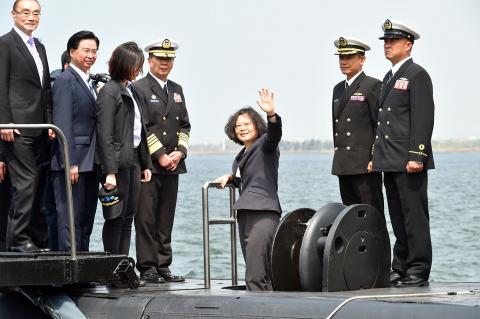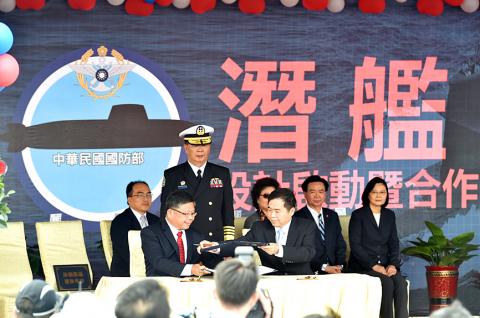The nation is hoping to build its first homegrown submarines within eight years and commission them into service within a decade, the shipbuilder tasked with carrying out the program said yesterday.
CSBC Corp, Taiwan (台灣國際造船) chairman Cheng Wen-lung (鄭文隆) said there were problems that needed to be worked out because Taiwan lacks experience in building submarines, but added that the difficulties were being addressed.
CSBC, the nation’s only listed shipbuilder, has built more than 100 ships for the navy and will use that experience in developing the local submarine program, he added.

Photo: Chang Chung-i, Taipei Times
Cheng’s comments came as CSBC and the Chungshan Institute of Science and Technology signed a memorandum of understanding (MOU) with the navy earlier yesterday in Kaohsiung to jointly build submarines for the military.
The project is part of a broader initiative to develop an independent national defense industry.
The project will have two main phases, the MOU said.

Photo: Chang Chung-i, Taipei Times
The first will be to complete the design for the submarines and will have a budget of about NT$2 billion (US$65.66 million), Cheng said.
The second stage will involve building the submarines, he said, without giving any cost projections for the vessels or estimates of how many submarines would be built.
According to the schedule, the indigenous submarines are to be completed within eight years and then commissioned into service within a decade, he said.
Cheng was asked about the planned submarines’ design and whether it would be based on the designs of existing submarines in the navy’s fleet, which were purchased from the US in the 1970s and the Netherlands in the 1980s.
“The design will be based on a model that meets the needs of Taiwan’s self-defense,” he said.
Institute vice president Gao Chung-hsing (杲中興) said that the most important part of the program is building a system that integrates all equipment and ensures the safety of ships operating underwater.
The institute will cooperate with CSBC in these areas, Gao said.
Yesterday’s signing was also witnessed by President Tsai Ing-wen (蔡英文), who said the construction of submarines is the most challenging aspect of the nation’s policy to create an independent national defense industry.
The government will exhaust all means and pool its resources to solve any problems associated with building the submarines, she said.
Minister of National Defense Feng Shih-kuan (馮世寬) also attended the signing ceremony, which was preceded by the formal send-off of a fleet of navy vessels on a training mission that will include goodwill visits to some of the nation’s diplomatic allies.
During the ceremony, Tsai boarded the Hai Lung-class submarine the Hai Hu in Zuoying Military Harbor to watch a simulation of a torpedo launch.
Taiwan has long tried to acquire submarines from other countries with little success because of their reluctance to upset China.
In 2001, then-US president George W. Bush authorized the sale of eight diesel-electric submarines to Taiwan, but the deal never came to fruition because of political wrangling in Taiwan and questions over whether the US, which did not produce conventional submarines at the time, could supply the vessels.

AGING: As of last month, people aged 65 or older accounted for 20.06 percent of the total population and the number of couples who got married fell by 18,685 from 2024 Taiwan has surpassed South Korea as the country least willing to have children, with an annual crude birthrate of 4.62 per 1,000 people, Ministry of the Interior data showed yesterday. The nation was previously ranked the second-lowest country in terms of total fertility rate, or the average number of children a woman has in her lifetime. However, South Korea’s fertility rate began to recover from 2023, with total fertility rate rising from 0.72 and estimated to reach 0.82 to 0.85 by last year, and the crude birthrate projected at 6.7 per 1,000 people. Japan’s crude birthrate was projected to fall below six,

US President Donald Trump in an interview with the New York Times published on Thursday said that “it’s up to” Chinese President Xi Jinping (習近平) what China does on Taiwan, but that he would be “very unhappy” with a change in the “status quo.” “He [Xi] considers it to be a part of China, and that’s up to him what he’s going to be doing, but I’ve expressed to him that I would be very unhappy if he did that, and I don’t think he’ll do that. I hope he doesn’t do that,” Trump said. Trump made the comments in the context

SELF-DEFENSE: Tokyo has accelerated its spending goal and its defense minister said the nation needs to discuss whether it should develop nuclear-powered submarines China is ramping up objections to what it sees as Japan’s desire to acquire nuclear weapons, despite Tokyo’s longstanding renunciation of such arms, deepening another fissure in the two neighbors’ increasingly tense ties. In what appears to be a concerted effort, China’s foreign and defense ministries issued statements on Thursday condemning alleged remilitarism efforts by Tokyo. The remarks came as two of the country’s top think tanks jointly issued a 29-page report framing actions by “right-wing forces” in Japan as posing a “serious threat” to world peace. While that report did not define “right-wing forces,” the Chinese Ministry of Foreign Affairs was

PREPAREDNESS: Given the difficulty of importing ammunition during wartime, the Ministry of National Defense said it would prioritize ‘coproduction’ partnerships A newly formed unit of the Marine Corps tasked with land-based security operations has recently replaced its aging, domestically produced rifles with more advanced, US-made M4A1 rifles, a source said yesterday. The unnamed source familiar with the matter said the First Security Battalion of the Marine Corps’ Air Defense and Base Guard Group has replaced its older T65K2 rifles, which have been in service since the late 1980s, with the newly received M4A1s. The source did not say exactly when the upgrade took place or how many M4A1s were issued to the battalion. The confirmation came after Chinese-language media reported